Unit 4第一册
综合教程第一册 Unit 4学习提纲
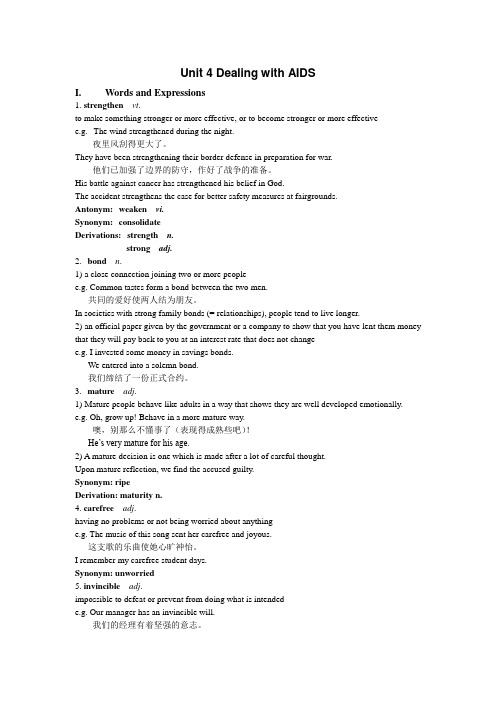
Unit 4 Dealing with AIDSI.Words and Expressions1. strengthen vt.to make something stronger or more effective, or to become stronger or more effectivee.g.The wind strengthened during the night.夜里风刮得更大了。
They have been strengthening their border defense in preparation for war.他们已加强了边界的防守,作好了战争的准备。
His battle against cancer has strengthened his belief in God.The accident strengthens the case for better safety measures at fairgrounds.Antonym:weaken vi.Synonym:consolidateDerivations:strength n.strong adj.2.bond n.1) a close connection joining two or more peoplee.g. Common tastes form a bond between the two men.共同的爱好使两人结为朋友。
In societies with strong family bonds (= relationships), people tend to live longer.2) an official paper given by the government or a company to show that you have lent them money that they will pay back to you at an interest rate that does not changee.g. I invested some money in savings bonds.We entered into a solemn bond.我们缔结了一份正式合约。
第一册Unit 4新编实用英语教程第4版高教社教案
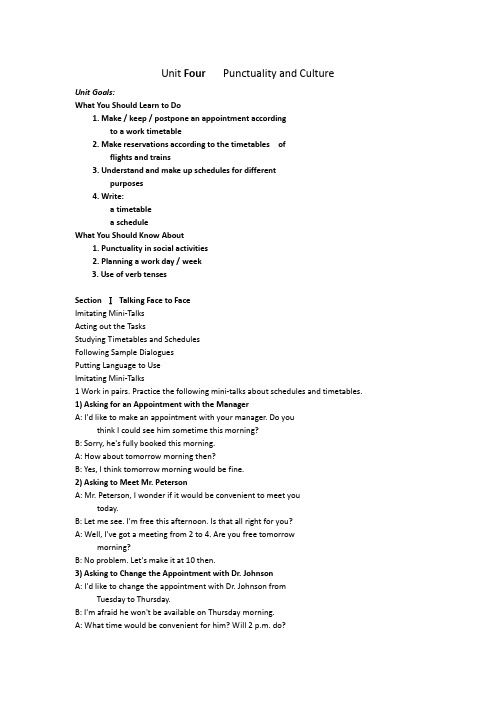
Unit Four Punctuality and CultureUnit Goals:What You Should Learn to Do1. Make / keep / postpone an appointment accordingto a work timetable2. Make reservations according to the timetables offlights and trains3. Understand and make up schedules for differentpurposes4. Write:a timetablea scheduleWhat You Should Know About1. Punctuality in social activities2. Planning a work day / week3. Use of verb tensesSection ⅠTalking Face to FaceImitating Mini-TalksActing out the TasksStudying Timetables and SchedulesFollowing Sample DialoguesPutting Language to UseImitating Mini-Talks1 Work in pairs. Practice the following mini-talks about schedules and timetables.1) Asking for an Appointment with the ManagerA: I'd like to make an appointment with your manager. Do youthink I could see him sometime this morning?B: Sorry, he's fully booked this morning.A: How about tomorrow morning then?B: Yes, I think tomorrow morning would be fine.2) Asking to Meet Mr. PetersonA: Mr. Peterson, I wonder if it would be convenient to meet youtoday.B: Let me see. I'm free this afternoon. Is that all right for you?A: Well, I've got a meeting from 2 to 4. Are you free tomorrowmorning?B: No problem. Let's make it at 10 then.3) Asking to Change the Appointment with Dr. JohnsonA: I'd like to change the appointment with Dr. Johnson fromTuesday to Thursday.B: I'm afraid he won't be available on Thursday morning.A: What time would be convenient for him? Will 2 p.m. do?B: Yes, that'll be fine.4) Asking About the Working Hours of a Ticket OfficeA: What are the office hours?B: Well, the office hours are from 9 a.m. to 6 p.m.A: Do you work on weekends?B: On Saturday the office is open from 9 a.m. to 3 p.m., but on Sunday we are closed.5) Asking About the Flights for MacaoA: Do you have flights to Macao?B: We have only one flight to Macao each week, at 1:40 p.m.Wednesday.A: When does it arrive in Macao?B: At 3:40 p.m.2 Work in pairs and act out the tasks by following the above mini-talks.1 Task:Look at the flight timetable in Exercise 3.Ask about the departure and arrival time2 Task:Look at the flight timetable in Exercise 3.Ask about the Tuesday flight for Hong Kong3 Task:Look at Mark's schedule in Exercise 3.Call to ask Mark for a change of an appointment.4 Task:Look at Mark's schedule in Exercise 3.Ask to make an appointment to see Mark on Wednesday.5 Task:Look at Mark's schedule in Exercise 3.An old friend in Hong Kong asks to see Mark on Thursday.Studying Timetables and SchedulesRead the following sample dialogues and try to perform your own tasks.Putting Language to UseSpeak and CompleteMark: Miss Wang, I want to 1 __________ an evening train to Harbin so thatI can get there the next morning. Do you know the schedule?Miss Wang: Yes. I have got a 2 __________________ here.Mark: Is there a train leaving around 6?Miss Wang: 3 ______________ one at 6:15.Mark: When will it get there?Miss Wang: 4 ______________ at about 8 next morning.Mark: That's the one I need. Thank you very much.Miss Wang: You are 5 ______________.SECTION II Being All EarsLearning Sentences for Workplace CommunicationHandling a DialogueUnderstanding a Short Speech / TalkLearning Sentences for Workplace Communication1 Listen to 10 sentences for workplace communication cross-referenced withtheir Chinese translations.arrange 安排confirm 确认due 规定(到达) 的delay 耽搁2 Listen to the following sentences for workplace communication in Column A andmatch each one with its Chinese version in Column BKey:1-i, 2-j, 3-d, 4-c, 5-f, 6-e, 7-h, 8-g, 9-a, 10-b3 Listen to 6 sentences for workplace communication and choose their right responses4 Listen to a dialogue and decode the message by filling in Susan's scheduleaccording to what you have heard.5 Now listen to a short speech / talk and fill up the blanks according to what youhave heard. The words in brackets will give you some hints.6 Listen to the speech / talk again and complete the information in Column A withthe right choices in Column B.SECTION III Trying Your HandPracticing Applied WritingWriting Sentences and Reviewing Grammar1 Fill in the office hours making use of the information in the passage that follows.2 Translate the following schedule into English, using the data bank in theWorkbook for reference.Writing Sentences and Reviewing Grammar3 Complete the following sentences, using the right verb forms4 Correct the errors in the following sentences.5 Translate the following sentences into English6 Suppose this is your schedule for the coming three days. Write a paragraph ofabout 100 words based on the information given in the schedule. You maystart the passage with the sentence: I've got a very busy schedule.KEYS: I've got a very busy schedule. I'm catching the 9:45 flight on October 8 and arriving in Shanghai at 2:00 in the afternoon. Bob is meeting me at the airport. I will check into Beach Hotel and have a rest there in the evening. On October 9, I'm meeting Mrs. Black at 10:15 a.m. and after having lunch at Beach Hotel we're visiting the plant at 2:30 p.m. The next day I'm attending a conference at 9 a.m. I'm leaving Shanghai in the afternoon. I'm taking a flight at 3:30 p.m. and arriving back at 7:45 p.m. Phillip will be there to pick me up at the airport.SECTION IV Maintaining a Sharp EyeInformation Related to the Reading PassageAmericans and Europeans consider time to be an asset that can be spent and saved; therefore, proper scheduling of time and its appropriate allocation to various competing tasks is an important part of organizational management. Variations in time use are expected to influence performance and stress, as well as other outcomes. It is a vital strategic element. Thelarge amount of management processes and methods developed to improve performance by managing time use proves the importance placed on time. Here are a few famous quotes and sayings about time and punctuality:1 Explanation of Difficult Sentences1. (Para. 1) One of the cultural differences that tend to annoy Americans has to dowith understanding of punctuality.Analysis: Has to do with is a phrase meaning has a specified relationship with.It is the predicate of the sentence. That introduces a restrictive relativeclause modifying differences.Translation:有一种常会惹恼美国人的文化差异可能关系到对守时的不同理解。
外研版(2019)高中英语必修第一册Unit 4课文知识点讲义
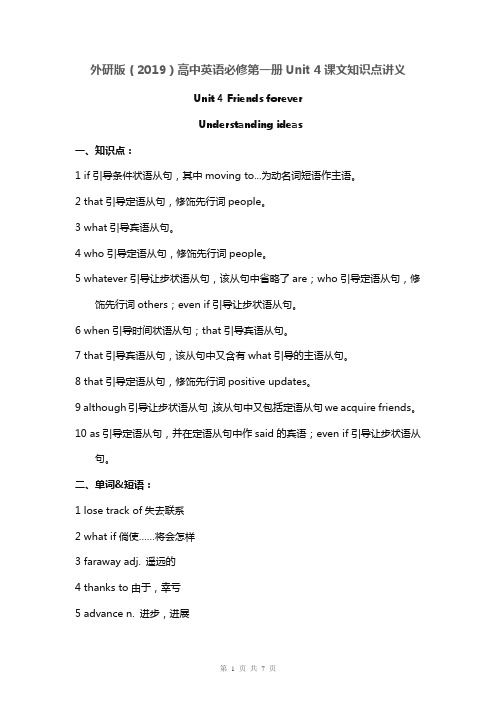
外研版(2019)高中英语必修第一册Unit 4课文知识点讲义Unit 4 Friends foreverUnderstanding ideas一、知识点:1 if引导条件状语从句,其中moving to...为动名词短语作主语。
2 that引导定语从句,修饰先行词people。
3 what引导宾语从句。
4 who引导定语从句,修饰先行词people。
5 whatever引导让步状语从句,该从句中省略了are;who引导定语从句,修饰先行词others;even if引导让步状语从句。
6 when引导时间状语从句;that引导宾语从句。
7 that引导宾语从句,该从句中又含有what引导的主语从句。
8 that引导定语从句,修饰先行词positive updates。
9 although引导让步状语从句,该从句中又包括定语从句we acquire friends。
10 as引导定语从句,并在定语从句中作said的宾语;even if引导让步状语从句。
二、单词&短语:1 lose track of失去联系2 what if倘使……将会怎样3 faraway adj. 遥远的4 thanks to由于,幸亏5 advance n. 进步,进展6 make friends交朋友7 communicate with与……交流8 significantly adv. 重大地;显著地9 stay in touch with与……保持联系10 social media 社交媒体11 up to忙于12 maintain v. 保持,维持13 digital adj. 数字的,数码的14 enable v. 使可能,使发生15 unusual adj. 异常的,不平常的16 meaningful adj. 有意义的17 keep in mind 记住18 site n. 网站19 tend v. 易于做某事,往往会发生某事20 criminal n.罪犯21 bathwater n.洗澡水throw the baby out with the bathwater不分良莠一起抛弃22 long for渴望三、课文CLICK FOR A FRIEND?How would you feel (1) if moving to a new town meant losing track of your friends? What if the only way of getting news from farawayfriends was writing letters that took ages to be delivered? This was how things worked not very long ago. Thanks to advances in technology, how we make friends and communicate with them has changed significantly.Nowadays, we can move around the world and still stay in touch with the people (2) that we want to remain friends with. Social media tools let us see (3) what our friends are up to and maintain friendships. All you need is a wi-fi connection.The digital age also enables us to find people (4) who share our interests, such as collecting model cars or playing an unusual instrument.(5) Whatever our hobbies, the Internet can connect us with others who also enjoy doing them, even if they live on the other side of the world.But (6) when you "friend" people online, does this mean that they really are your friends?It depends.If people always exchange true personal information online, then yes, these friendships can be real and meaningful. But we need to keep in mind (7) that what we see on social media is often not the whole truth about a person. fOn social media sites, people tend to post only positive updates (8) that make them appear happy and friendly. But smiling photos can hide real problems. Remember the saying: on the Internet, nobody knows you' re a dog. A young person could be old; a woman could be a man; we。
高级英语第一册Unit 4 文章结构+课文讲解+课文翻译+课后练习+答案
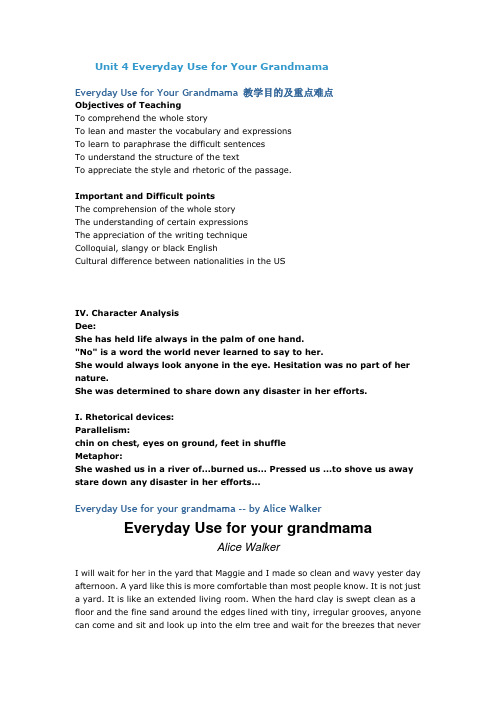
Unit 4 Everyday Use for Your GrandmamaEveryday Use for Your Grandmama 教学目的及重点难点Objectives of TeachingTo comprehend the whole storyTo lean and master the vocabulary and expressionsTo learn to paraphrase the difficult sentencesTo understand the structure of the textTo appreciate the style and rhetoric of the passage.Important and Difficult pointsThe comprehension of the whole storyThe understanding of certain expressionsThe appreciation of the writing techniqueColloquial, slangy or black EnglishCultural difference between nationalities in the USIV. Character AnalysisDee:She has held life always in the palm of one hand."No" is a word the world never learned to say to her.She would always look anyone in the eye. Hesitation was no part of her nature.She was determined to share down any disaster in her efforts.I. Rhetorical devices:Parallelism:chin on chest, eyes on ground, feet in shuffleMetaphor:She washed us in a river of...burned us... Pressed us ...to shove us away stare down any disaster in her efforts...Everyday Use for your grandmama -- by Alice WalkerEveryday Use for your grandmamaAlice WalkerI will wait for her in the yard that Maggie and I made so clean and wavy yester day afternoon. A yard like this is more comfortable than most people know. It is not just a yard. It is like an extended living room. When the hard clay is swept clean as a floor and the fine sand around the edges lined with tiny, irregular grooves, anyone can come and sit and look up into the elm tree and wait for the breezes that nevercome inside the house.Maggie will be nervous until after her sister goes: she will stand hopelessly in corners, homely and ashamed of the burn scars down her arms and legs, eying her sister with a mixture of envy and awe. She thinks her sister has held life always in the palm of one hand, that "no" is a word the world never learned to say to her.You've no doubt seen those TV shows where the child who has "made it" is confronted, as a surprise, by her own mother and father, tottering in weakly from backstage. (A Pleasant surprise, of course: What would they do if parent and child came on the show only to curse out and insult each other?) On TV mother and child embrace and smile into each other's face. Sometimes the mother and father weep, the child wraps them in her arms and leans across the table to tell how she would not have made it without their help. I have seen these programs.Sometimes I dream a dream in which Dee and I are suddenly brought together on a TV program of this sort. Out of a cark and soft-seated limousine I am ushered into a bright room filled with many people. There I meet a smiling, gray, sporty man like Johnny Carson who shakes my hand and tells me what a fine girl I have. Then we are on the stage and Dee is embracing me with tear s in her eyes. She pins on my dress a large orchid, even though she has told me once that she thinks or chides are tacky flowers.In real life I am a large, big-boned woman with rough, man-working hands. In the winter I wear flannel nightgowns to bed and overalls during the day. I can kill and clean a hog as mercilessly as a man. My fat keeps me hot in zero weather. I can work outside all day, breaking ice to get water for washing; I can eat pork liver cooked over the open tire minutes after it comes steaming from the hog. One winter I knocked a bull calf straight in the brain between the eyes with a sledge hammer and had the meat hung up to chill be-fore nightfall. But of course all this does not show on television. I am the way my daughter would want me to be: a hundred pounds lighter, my skin like an uncooked barley pan-cake. My hair glistens in the hot bright lights. Johnny Car – son has much to do to keep up with my quick and witty tongue.But that is a mistake. I know even before I wake up. Who ever knew a Johnson with a quick tongue? Who can even imagine me looking a strange white man in the eye? It seems to me I have talked to them always with one toot raised in flight, with my head turned in whichever way is farthest from them. Dee, though. She would always look anyone in the eye. Hesitation was no part of her nature."How do I look, Mama?" Maggie says, showing just enough of her thin body enveloped in pink skirt and red blouse for me to know she's there, almost hidden by the door."Come out into the yard," I say.Have you ever seen a lame animal, perhaps a dog run over by some careless person rich enough to own a car, sidle up to someone who is ignorant enough to be kind of him? That is the way my Maggie walks. She has been like this, chin on chest, eyes on ground, feet in shuffle, ever since the fire that burned the other house to theground.Dee is lighter than Maggie, with nicer hair and a fuller figure. She's a woman now, though sometimes I forget. How long ago was it that the other house burned? Ten, twelve years? Sometimes I can still hear the flames and feel Maggie's arms sticking to me, her hair smoking and her dress falling off her in little black papery flakes. Her eyes seemed stretched open, blazed open by the flames reflect-ed in them. And Dee. I see her standing off under the sweet gum tree she used to dig gum out of; a look at concentration on her face as she watched the last dingy gray board of the house tall in toward the red-hot brick chimney. Why don't you do a dance around the ashes? I'd wanted to ask her. She had hated the house that much.I used to think she hated Maggie, too. But that was before we raised the money, the church and me, to send her to Augusta to school. She used to read to us without pity, forcing words, lies, other folks' habits, whole lives upon us two, sitting trapped and ignorant underneath her voice. She washed us in a river of make-believe, burned us with a lot of knowledge we didn't necessarily need to know. Pressed us to her with the serious way she read, to shove us away at just the moment, like dimwits, we seemed about to understand.Dee wanted nice things. A yellow organdy dress to wear to her graduation from high school; black pumps to match a green suit she'd made from an old suit somebody gave me. She was determined to stare down any disaster in her efforts. Her eyelids would not flicker for minutes at a time. Often I fought off the temptation to shake her. At sixteen she had a style of her own' and knew what style was.I never had an education myself. After second grade the school was closed down. Don't ask me why. in 1927 colored asked fewer questions than they do now. Sometimes Maggie reads to me. She stumbles along good-naturedly but can't see well. She knows she is not bright. Like good looks and money, quickness passed her by. She will marry John Thomas (who has mossy teeth in an earnest face) and then I'll be free to sit here and I guess just sing church songs to myself. Although I never was a good singer. Never could carry a tune. I was always better at a man's job. 1 used to love to milk till I was hooked in the side in '49. Cows are soothing and slow and don't bother you, unless you try to milk them the wrong way.I have deliberately turned my back on the house. It is three rooms, just like the one that burned, except the roof is tin: they don't make shingle roofs any more. There are no real windows, just some holes cut in the sides, like the portholes in a ship, but not round and not square, with rawhide holding the shutter s up on the outside. This house is in a pasture, too, like the other one. No doubt when Dee sees it she will want to tear it down. She wrote me once that no matter where we "choose" to live, she will manage to come see us. But she will never bring her friends. Maggie and I thought about this and Maggie asked me, Mama, when did Dee ever have any friends?"She had a few. Furtive boys in pink shirts hanging about on washday after school. Nervous girls who never laughed. Impressed with her they worshiped the well-turned phrase, the cute shape, the scalding humor that erupted like bubbles inlye. She read to them.When she was courting Jimmy T she didn't have much time to pay to us, but turned all her faultfinding power on him. He flew to marry a cheap city girl from a family of ignorant flashy people. She hardly had time to recompose herself.When she comes I will meet -- but there they are!Maggie attempts to make a dash for the house, in her shuffling way, but I stay her with my hand. "Come back here," I say. And she stops and tries to dig a well in the sand with her toe.It is hard to see them clearly through the strong sun. But even the first glimpse of leg out of the car tells me it is Dee. Her feet were always neat-looking, as it God himself had shaped them with a certain style. From the other side of the car comes a short, stocky man. Hair is all over his head a foot long and hanging from his chin like a kinky mule tail. I hear Maggie suck in her breath. "Uhnnnh," is what it sounds like. Like when you see the wriggling end of a snake just in front of your toot on the road. "Uhnnnh."Dee next. A dress down to the ground, in this hot weather. A dress so loud it hurts my eyes. There are yel-lows and oranges enough to throw back the light of the sun. I feel my whole face warming from the heat waves it throws out. Earrings gold, too, and hanging down to her shoulders. Bracelets dangling and making noises when she moves her arm up to shake the folds of the dress out of her armpits. The dress is loose and flows, and as she walks closer, I like it. I hear Maggie go "Uhnnnh" again. It is her sister's hair. It stands straight up like the wool on a sheep. It is black as night and around the edges are two long pigtails that rope about like small lizards disappearing behind her ears."Wa-su-zo-Tean-o!" she says, coming on in that gliding way the dress makes her move. The short stocky fellow with the hair to his navel is all grinning and he follows up with "Asalamalakim, my mother and sister!" He moves to hug Maggie but she falls back, right up against the back of my chair. I feel her trembling there and when I look up I see the perspiration falling off her chin."Don't get up," says Dee. Since I am stout it takes something of a push. You can see me trying to move a second or two before I make it. She turns, showing white heels through her sandals, and goes back to the car. Out she peeks next with a Polaroid. She stoops down quickly and lines up picture after picture of me sitting there in front of the house with Maggie cowering behind me. She never takes a shot without making sure the house is included. When a cow comes nibbling around the edge of the yard she snaps it and me and Maggie and the house. Then she puts the Polaroid in the back seat of the car, and comes up and kisses me on the forehead.Meanwhile Asalamalakim is going through motions with Maggie's hand. Maggie's hand is as limp as a fish, and probably as cold, despite the sweat, and she keeps trying to pull it back. It looks like Asalamalakim wants to shake hands but wants to do it fancy. Or maybe he don't know how people shake hands. Anyhow, he soon gives up on Maggie."Well," I say. "Dee.""No, Mama," she says. "Not 'Dee', Wangero Leewanika Kemanjo!""What happened to 'Dee'?" I wanted to know."She's dead," Wangero said. "I couldn't bear it any longer, being named after the people who oppress me.""You know as well as me you was named after your aunt Dicle," I said. Dicie is my sister. She named Dee. We called her "Big Dee" after Dee was born."But who was she named after?" asked Wangero."I guess after Grandma Dee," I said."And who was she named after?" asked Wangero."Her mother," I said, and saw Wangero was getting tired. "That's about as far back as I can trace it," I said.Though, in fact, I probably could have carried it back beyond the Civil War through the branches."Well," said Asalamalakim, "there you are.""Uhnnnh," I heard Maggie say."There I was not," I said, before 'Dicie' cropped up in our family, so why should I try to trace it that far back?"He just stood there grinning, looking down on me like somebody inspecting a Model A car. Every once in a while he and Wangero sent eye signals over my head."How do you pronounce this name?" I asked."You don't have to call me by it if you don't want to," said Wangero."Why shouldn't I?" I asked. "If that's what you want us to call you, we'll call you. ""I know it might sound awkward at first," said Wangero."I'll get used to it," I said. "Ream it out again."Well, soon we got the name out of the way. Asalamalakim had a name twice as long and three times as hard. After I tripped over it two or three times he told me to just call him Hakim-a-barber. I wanted to ask him was he a barber, but I didn't really think he was, so I don't ask."You must belong to those beet-cattle peoples down the road," I said. They said "Asalamalakirn" when they met you too, but they didn't Shake hands. Always too busy feeding the cattle, fixing the fences, putting up salt-lick shelters, throwing down hay. When the white folks poisoned some of the herd the men stayed up all night with rifles in their hands. I walked a mile and a half just to see the sight.Hakim-a-barber said, "I accept some of their doctrines, but farming and raising cattle is not my style." (They didn't tell me, and I didn't ask, whether Wangero (Dee) had really gone and married him.)We sat down to eat and right away he said he didn't eat collards and pork was unclean. Wangero, though, went on through the chitlins and corn bread, the greens and every-thing else. She talked a blue streak over the sweet potatoes. Everything delighted her. Even the fact that we still used the benches her daddy made for the table when we couldn't afford to buy chairs."Oh, Mama!" she cried. Then turned to Hakim-a-barber. "I never knew how lovely these benches are. You can feel the rump prints," she said, running her handsunderneath her and along the bench. Then she gave a sigh and her hand closed over Grandma Dee's butter dish. "That's it!" she said. "I knew there was something I wanted to ask you if I could have." She jumped up from the table and went over in the corner where the churn stood, the milk in it clabber by now. She looked at the churn and looked at it."This churn top is what I need," she said. "Didn't Uncle Buddy whittle it out of a tree you all used to have?""Yes," I said."Uh huh, " she said happily. "And I want the dasher,too.""Uncle Buddy whittle that, too?" asked the barber.Dee (Wangero) looked up at me."Aunt Dee's first husband whittled the dash," said Maggie so low you almost couldn't hear her. "His name was Henry, but they called him Stash.""Maggie's brain is like an elephants," Wanglero said, laughing. "I can use the churn top as a center piece for the alcove table,”she said, sliding a plate over the churn, "and I'll think of something artistic to do with the dasher."When she finished wrapping the dasher the handle stuck out. I took it for a moment in my hands. You didn't even have to look close to see where hands pushing the dasher up and down to make butter had left a kind of sink in the wood. In fact, there were a lot of small sinks; you could see where thumbs and fingers had sunk into the wood. It was beautiful light yellow wood, from a tree that grew in the yard where Big Dee and Stash had lived.After dinner Dee (Wangero) went to the trunk at the foot of my bed and started rifling through it. Maggie hung back in the kitchen over the dishpan. Out came Wangero with two quilts. They had been pieced by Grandma Dee and then Big Dee and me had hung them on the quilt frames on the front porch and quilted them. One was in the Lone Star pattern. The other was Walk Around the Mountain. In both of them were scraps of dresses Grandma Dee had worn fifty and more years ago. Bit sand pieces of Grandpa Jarrell's Paisley shirts. And one teeny faded blue piece, about the size of a penny matchbox, that was from Great Grandpa Ezra's uniform that he wore in the Civil War."Mama," Wangero said sweet as a bird. "Can I have these old quilts?"I heard something fall in the kitchen, and a minute later the kitchen door slammed."Why don't you take one or two of the others?” 1 asked. "These old things was just done by me and Big Dee from some tops your grandma pieced before she died.""No," said Wangero. "I don't want those. They are stitched around the borders by machine.""That'll make them last better," I said."That's not the point," said Wanglero. "These are all pieces of dresses Grandma used to wear. She did all this stitching by hand. Imagine!" She held the quilts securely in her arms, stroking them."Some of the pieces, like those lavender ones, come from old clothes her mother handed down to her,” I said, movi ng up to touch the quilts. Dee (Wangero)moved back just enough so that I couldn't reach the quilts. They already belonged to her. "Imagine!" she breathed again, clutching them closely to her bosom."The truth is," I said, "I promised to give them quilts to Maggie, for when she marries John Thomas."She gasped like a bee had stung her."Maggie can't appreciate these quilts!" she said. "She'd probably be backward enough to put them to everyday use.""I reckon she would," I said. "God knows I been sav age ’em for long enough with nobody using 'em. I hope she will! ” I didn't want to bring up how I had offered Dee (Wangero) a quilt when she went away to college. Then she had told me they were old-fashioned, out of style."But they're priceless!" she was saying now, furiously, for she has a temper. "Maggie would put them on the bed and in five years they'd be in rags. Less than that!" "She can always make some more,” I said. "Maggie knows how to quilt. "Dee (Wangero) looked at me with hatred. "You just will not understand. The point is these quilts, these quilts!""Well," I said,, stumped. "What would you do with them?""Hang them," she said. As it that was the only thing you could do with quilts.Maggie by now was standing in the door. I could almost hear the sound her feet made as they scraped over each other."She can have them, Mama,” she said like somebody used to never winning anything, or having anything reserved for her. "I can 'member Grandma Dee without the quilts."I looked at her hard. She had filled her bottom lip with checkerberry snuff and it gave her face a kind of dopey, hangdog look. It was Grandma Dee and Big Dee who taught her how to quilt herself. She stood there with her scarred hands hidden in the folds of her skirt. She looked at her sister with something like fear but she wasn't mad at her. This was Maggie's portion. This was the way she knew God to work.When I looked at her like that something hit me in the top of my head and ran down to the soles of my feet. Just like when I'm in church and the spirit of God touches me and I get happy and shout. I did something I never had done before: hugged Maggie to me, then dragged her on into the room, snatched the quilts out of Miss Wangero's hands and dumped them into Maggie's lap. Maggie just sat there on my bed with her mouth open."Take one or two of the others," I said to Dee.But she turned without a word and went out to Hakim-a-barber."You just don't understand," she said, as Maggie and I came out to the car."What don't I under stand?" I wanted to know."Your heritage," she said. And then she turned to Maggie, kissed her, and said, "You ought to try to make some-thing of yourself, too, Maggie. It's really a new day for us. But from the way you and Mama still live you'd never know it."She put on some sunglasses that hid everything above the tip of her nose and her chin.Maggie smiled; maybe at the sunglasses. But a real mile, not scared. After we watched the car dust settle I asked Maggie to bring me a dip of snuff. And then the two of us sat there just enjoying, until it was time to go in the house and go to bed.--------------------------------------------------------------------------------NOTES1) Alice Walker: born 1944 in Eatonton, Georgia, America and graduated from Sarah Lawrence College. Her books include The Third Life of Grange Copeland ( 1970 ), Meridian ( 1976 ), The Color Purple(1982), etc.2)"made it": to become a success, to succeed, either in specific endeavor or in general3) Johnny Carson: a man who runs a late night talk show4)hooked: injured by the horn of the cow being milked5) Jimmy T: 'T' is the initial of the surname of the boy Dee was courting.6)"Wa-su-zo-Tean-o!": phonetic rendering of an African dialect salutation7) "Asalamalakim": phonetic rendering of a Muslim greeting8) Polaroid: a camera that produces instant pictures9) the Civil War: the war between the North and the South in the U. S.(1861-1865)10) branches: branches or divisions of a family descending from a common ancestor11) Ream it out again: "Ream" is perhaps an African dialect word meaning: "unfold, display". Hence the phrase may mean "repeat" or "say it once again"12) pork was unclean: Muslims are forbidden by their religion to eat pork because it is considered to be unclean.13) Chitlins: also chitlings or chitterlings, the small intestines of pigs, used for food,a common dish in Afro-American households14) rump prints: depressions in the benches made by constant sitting15) sink: depressions in the wood of the handle left by the thumbs and fingersBackground informationThe author wrote quite a number of novels, among them were The Color Purple which won the Pulitzer Prize of Fiction (普利策小说奖)and The American Book Award (美国图书奖). In 1985, the Color Purple was made into a movie which won great fame .Everyday Use for your grandmama 课文讲解/Detailed StudyEveryday Use for Your Grandmama--------------------------------------------------------------------------------Detailed Study of the Text1. wavy: having regular curvesA wavy line has a series of regular curves along it.The wavy lines are meant to represent water.Here in the text the word describes the marks in wavy patterns on the clay ground left by the broom.*image - 1* (此处加一细曲线图)2. groove: a long narrow path or track made in a surface, esp. to guide the movement of sth.A groove is a wide, deep line cut into a surface.The cupboard door slides open along the groove it fits into.3. homely: simple, not grand, (of people, faces, etc.,) not good-looking, ugly If someone is homely, they are not very attractive to look at; uased in Am.E.4. awe: Awe is the feeling of respect and amazement that you have when you are faced with sth. wonderful, frightening or completely unknown., wonderThe child stared at him in silent awe.5. confront: to face boldly or threateningly, encounterIf a problem, task, or difficulty confronts you, or you are confronted with it, it iss sth. that you cannot avoid and must deal withI was confronted with the task of designing and building the new system.6. totter: to move in an unsteady way from side to side as if about to fall, to walk with weak unsteady stepsThe old lady tottered down the stairs.7. limousine: A limousine is a large and very comfortable car, esp. one with a glass screen between the front and back seats. Limousines are usually driven by a chauffeur [ou]cf:sedan / saloon is a car with seats for four or more people, a fixed roof, and a boot (the space at the back of the car, covered by a lid, in which you carry things such luggage, shopping or tools) that is separate from the seating part of the car convertible: a car with a soft roof that can be folded down or removedsports car: a low usu. open car with room for only 2 people for traveling with high power and speedcoupe [‘ku:pei] a car with a fixed roof, a sloping back, two doors and seats for four peoplestation wagon (Am E) / estate car (Br.E) a car which has a long body with a door at the back end and space behind the back seats8. gray / grey: used to describe the colour of people’s hair when it changes from its original colour, usu. as they get old and before it becomes white9. tacky: (Am.E, slang) shabby10. overalls: are a single piece of clothing that combines trousers and a jacket. Your wear overalls over your clothes in order to protect them from dirt, paint, etc. while you are workingThe breast pocket of his overalls was filled with tools. (工装裤)11. hog:a. a pig, esp. a fat one for eatingb. a male pig that has been castratedc. a dirty personswine: (old & tech) pigboar [o:]: male pig on a farm that is kept for breedingsow [au]: fully grown female pig12. sledge hammer: large, heavy hammer for swinging with both hands, a large heavy hammer with a long handle, used for smashing concrete13. barley: 大麦14. pancake: a thin, flat circle of cooked batter (糊状物) made of milk, flour and eggs. usu. rolled up or folded and eaten hot with a sweet or savory filling inside15. sidle: walk as if ready to turn or go the other wayIf you sidle somewhere, you walk there uncertainly or cautiously, as if you do not want anyone to notice youA man sidled up to me and asked if I wanted a ticket for the match..16. shuffle: slow dragging walkIf you shuffle, you walk without lifting your feet properly off the groundHe slipped on his shoes and shuffled out of the room.If you shuffle, you move your feet about while standing or move your bottom about while sitting, often because you feel uncomfortable or embarrassed.I was shuffling in my seat.cf:totter (n.6), sidle(n. 15), shuffle17. blaze: to burn with a bright flameA wood fire was blazing, but there was no other light in the room.n. the sudden sharp shooting up of a flame, a very bright fireThe fire burned slowly at first, but soon burst into a blaze.18. sweet gum tree: a large North American tree of the witch hazel (榛子) family, with alternate maplelike leaves, spiny (多刺的) fruit balls, and flagrant juice美洲金缕梅, 落叶灌木或小乔木. 原产于北美和亚洲. 其分叉小枝从前用为魔杖, 这寻找地下水, 故俗称魔杖.19. dingy: dirty and fadedA building or place that is dingy is rather dark and depressing and does not seem to have been well looked after,.This is the dingiest street of the town.Clothes, curtains, etc. that are dingy are dirty or faded.20. raise: to collect togetherraise an army / raise enough money for a holidayHis wife raised the money by selling her jewellery.We’re trying to raise funds to establish a scholarship.21. underneath: (so as to go) under (sth..)The letter was pushed underneath the door.Did you find very much growing underneath the snow?(Here it suggests a repressive and imposing quality in her voice.)22. make-believe: a state of pretending or the things which are pretended She lives in a make-believe world / a world of make-believe.Don’t be afraid of monster - the story’s only make-believe.The little girl made believe she was a princess.23. shove: to push, esp. in a rough or careless wayThere was a lot of pushing and shoving to get on the bus.Help me to shove this furniture aside.If you shove sb. or sth., you push them with a quick, rather, violent movement. He dragged her out to the door and shoved her into the street.24. dimwit: (infml) an ignorant and stupid persondim: faint, not brightwit: intelligence, wisdomat one’s wit’s end: at the end of one’s tether25. organdy: (Br. E organdie) very fine transparent muslin (麦斯林纱, 平纹细布) with a stiff finish (最后一层涂饰), very fine rather stiff cotton material used esp. for women’s dresses(蝉翼纱, 玻璃纱)。
新视野大学英语第三版第一册unit4教案

一、教学目标1. 知识目标:(1)掌握本单元的核心词汇和短语;(2)理解文章的主旨大意和段落结构;(3)提高阅读理解能力。
2. 能力目标:(1)提高学生的口语表达能力;(2)培养学生的逻辑思维和批判性思维能力;(3)提高学生的写作能力。
3. 情感目标:(1)激发学生对英雄主义、勇敢和担当的思考;(2)培养学生具有积极向上的人生态度;(3)增强学生的团队协作精神和集体荣誉感。
二、教学重点与难点1. 教学重点:(1)核心词汇和短语的理解与运用;(2)文章主旨大意和段落结构的把握;(3)口语表达能力的提升。
2. 教学难点:(1)理解文章中的复杂句型和长难句;(2)分析文章的逻辑结构和论证方法;(3)培养学生的批判性思维能力。
三、教学方法与教学手段1. 教学方法:(1)启发式教学,引导学生主动思考;(2)小组讨论,培养学生的合作意识和团队精神;(3)情景模拟,提高学生的口语表达能力。
2. 教学手段:(1)多媒体课件,展示图片、视频等资料;(2)实物教具,如地图、图片等;(3)网络资源,如在线词典、阅读材料等。
四、教学过程(一)导入(5分钟)1. 教师简要介绍本单元主题:英雄主义;2. 学生分享自己心中的英雄,激发学生的兴趣。
(二)阅读理解(25分钟)1. 学生快速阅读文章,了解文章大意;2. 教师引导学生分析文章结构,总结段落大意;3. 学生细读文章,理解重点词汇和短语;4. 教师讲解长难句,帮助学生理解文章内容。
(三)口语表达(15分钟)1. 学生分组讨论,围绕文章主题展开讨论;2. 学生轮流发言,表达自己的观点;3. 教师点评,纠正学生的发音和语法错误。
(四)写作训练(15分钟)1. 教师讲解写作技巧,指导学生如何写一篇关于英雄主义的文章;2. 学生独立完成写作任务;3. 教师批改作文,给予学生反馈。
(五)课堂小结(5分钟)1. 教师总结本节课的重点内容;2. 学生分享自己的学习心得。
五、课后作业1. 复习本单元所学词汇和短语;2. 阅读相关文章,提高阅读理解能力;3. 撰写一篇关于英雄主义的文章,字数不少于300字。
人教版(2019))第一册Unit 4 Natural Disasters 单元核心考点

➢4.destroy vt.摧毁;毁灭;消灭;破坏(P49)
men. [衔接写作] 补全句子 ③ _R__es_c_u_e__te_a_m__s__ are using thermal imaging to locate survivors
of the earthquake. 救援队伍正利用热成像确定地震幸存者的位置。 ④ two children _w__e_r_e_r_e_s_cu__ed__f_r_o_m_ the burning car. 两名儿童从燃烧着的车中被救了出来。
chapter. ③She always referred to Ben _a_s______ “that nice man”.
[衔接写作] 补全句子 ①She m_a_d_e_n_o_r_e_f_er_e_n_c_e_to__ her illness but only to her future
3. Which buildings were damaged in Seoul?(教材P48)
句意:首尔的哪些建筑物受损了?
[知识回顾]
n.[u]损坏;损失;破坏;[p.]损害赔偿
damage
do/ cause damage to vt.损害;破坏
对…造成损害
damage one’s health 损害某人的健康
[巩固内化] 单句语法填空 ①_T_o__a_f_fe_c_t_ (affect) a policy is to have an _e_f_fe_c_t___(affect) on it. ②Television is an _e_f_f_e_ct_i_v_e_ (affcet) means of communication. [衔接写作] 完成句子
高一英语第一册 Unit 4 Unforgettable experiences人教版知识精讲

高一英语第一册 Unit 4 Unforgettable experiences人教版【本讲教育信息】一. 教学内容:Unit 4 Unforgettable experiences〔一〕重点单词〔二〕重点短语〔三〕重点句型二、知识精讲〔一〕重点单词:1. advance: v前进,进展,提前,提升→ The soldiers advanced on the enemy.士兵们向敌人进发。
→ A month has passed and the work has not advanced.一个月过去了,可是工作却没有进展。
→ The time of the meeting was advanced by an hour.会议时间提前一小时。
→ About 80% of the school-leavers advanced to senior middle schools.大约80%的学生升入高中。
→ He worked so well that his boss advanced him to a higher position.他工作干得很好,所以老板把他提升到一个更高的职位。
① in advance: 提前,预先→He wants to draw his salary in advance. 他要预支薪水。
② make advances: 取得进步〔make progress〕adj. advanced: 先进的,高级的,高深的→advanced education : 高等教育2. seize: vt.→ The soldiers decided to seize the town before dark.战士们决定在天黑前夺取这个城镇。
→ The policeman seized the thief by the arm.警察抓住了小偷的胳膊。
→ You should seize every chance to improve your English.你应该利用一切机会来提高你的英语水平。
高中英语必修第一册Unit 4 词汇课文译文

Unit 4disaster / dɪˈzɑ:stə(r) /n.灾难;灾害tornado /tɔ:ˈneɪdəʊ / n.(pl. -oes or -os) 龙卷风;旋风drought / draʊt / n.旱灾;久旱landslide / ˈlændslaɪd / n. ( landfall) (山地或悬崖的)崩塌;滑坡slide / slaɪd / vi. & vt. (使)滑行;滑动tsunami / tsu:ˈnɑ:mi /n.海啸flood /flʌd / n.洪水;大量vi.淹没;大量涌入vt.使灌满水;淹没volcanic eruption / vɔlˈkænɪk ɪˈrʌpʃn / 火山喷发magnitude /ˈmægnɪtju:d / n. (地)震级;重大rescue /ˈreskju:/n.& vt.营救;救援damage /ˈdæmɪdʒ / vt.损害;破坏 n.损坏;损失destroy /dɪ'strɔɪ/ vt.摧毁;毁灭evacuate /ɪˈvækjueɪt / vt.疏散;撤出 vi.撤离helicopter /ˈhelɪkɒptə(r)/ n.直升机death/ deθ/n. 死;死亡affect /ə'fekt/ vt.影响;(疾病)侵袭;深深打动shelter /'ʃeltə(r)/ n.避难处;居所;庇护vt.保护;掩蔽vi.躲避 (风、雨或危险)crack /kræk/ n.裂纹;裂缝vi. & vt. (使)破裂as if 似乎;好像;仿佛ruin /'ru:ɪn/ n.&vt. 破坏;毁坏in ruins 严重受损;破败不堪percent / pəˈsent / n.百分之……adj.&adv.每一百种brick /brɪk/ n.砖;砖块metal /'metl/ n.金属shock /ʃɒk/ n.震惊;令人震惊的事;休克vt.(使)震惊in shock 震惊;吃惊electricity /ɪˌlekˈtrɪsəti/ n.电;电能trap /træp/ vt.使落入险境;使陷入圈套n.险境;陷阱bury /ˈberi/vt.埋葬;安葬breathe / bri:ð/ vi.& vt.呼吸revive /rɪˈvaɪv/ vt.& vi.复活;(使)苏醒revival /rɪˈvaɪvl/ n.振兴;复苏effort /'efət/ n.努力;艰难的尝试;尽力unify /ˈju:nɪfaɪ / vi.& vt.统一;(使)成一体wisdom /ˈwɪzdəm/ n.智慧;才智context /ˈkɒntekst/ n.上下文;语境;背景suffer /ˈsʌfə/ vt.遭受;蒙受vi. (因疾病、痛苦、悲伤等)受苦volcano /vɒlˈkeɪnəʊ/ n. (pl. -oes or -os)火山erupt /ɪˈrʌpt/ vi.& vt. (火山)爆发;(岩浆、烟等)喷出supply /səˈplaɪ/ n.供应(量);补给;[pl.] 补给品vt.供应;供给typhoon /taɪˈfu:n/ n.台风in the open air 露天;在户外hurricane /ˈhʌrɪkən/ n . (尤指大西洋的)飓风survive /səˈvaɪv/ vi.生存;存活 vt. 幸存;艰难度过power /ˈpaʊə(r)/ n.电力供应;力量;控制力tap /tæp/ vi.& vt.轻叩;轻敲;轻拍n.水龙头;轻叩;轻敲pipe /paɪp/ n.管子;管道whistle /ˈwɪsl/ vi.吹口哨;发出笛声vt.吹口哨n.哨子(声);呼啸声emergency /iˈmɜ:dʒənsi/ n.突发事件;紧急情况calm /kɑ:m/adj.镇静的;沉着的 vt.使平静;使镇静aid /eɪd/ n.援助;帮助;救援物资 vi.& vt. (formal) 帮助;援助kit /kɪt/ n.成套工具;成套设备first aid kit 急救箱on hand现有(尤指帮助)crash /kræʃ/ vt.& vi.碰撞;撞击 n.撞车;碰撞sweep /swi:p/ vt. & vi. ( swept, swept) 打扫;清扫sweep away消灭;彻底消除wave /weɪv/ n.海浪;波浪vi.& vt.挥手;招手strike /straɪk/ vi.& vt. (struck, struck/stricken) 侵袭;突击;击打n. 罢工;罢课;袭击deliver /dɪˈlɪvə(r)/ vt. & vi.递送;传达vt.发表summary /ˈsʌməri/ n.总结;概括;概要effect /ɪˈfekt/ n.影响;结果;效果length /leŋθ/n.长;长度THE NIGHT THE EARTH DIDN’T SLEEP地球的一个不眠之夜Strange things were happening in the countryside of northeastern Hebei. For several days,the water in the village wells rose and fell,rose and fell. There were deep cracks that appeared in the well walls. At least one well had some smelly gas coming out of it. Chickens and even pigs were too nervous to eat,and dogs refused to go inside buildings. Mice ran out of the fields looking for places to hide,and fish jumped out of the water. At about 3:00 a.m., on 28 July 1976,bright lights were seen in the sky outside the city of Tangshan and loud noises were heard. But the city’s one million people were asleep as usual that night.河北省东北部的农村地区怪事连连:一连几天,村子里的井水升升降降,起起伏伏,井壁上出现了深深的裂缝。
必修第一册 Unit 4 长难句分析-2023年高考英语一轮复习
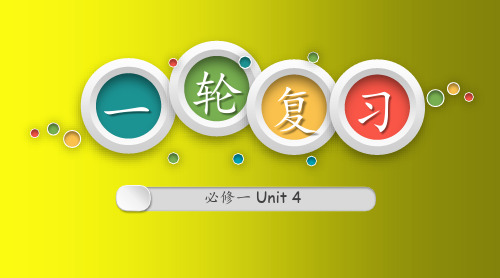
现在分词作伴随状语
The boy sat in front of the farmhouse, cutting the branch. All night long he lay awake, thinking of the problem. The six blind men stood there begging for a meal. He sat in the armchair, reading a newspaper. They stood there for half an hour watching the stars in the sky. He sat in the chair reading a newspaper. Don't you sit there doing nothing.
长难句理解
现在分词做伴随状语
Mice ran out of the fields looking for places to hide, and fish jumped out of the water.
and 连接并列句
老鼠跑到田外,寻找藏身之所,鱼儿也跳出水面。
现在分词作伴随状语
理解技巧:
理解“伴随状语”的关键是要理解“伴随”二字。 分词(短语)用作伴随状语时,它表示的动作伴随句子谓语动 作同时发生,即句子谓语所表示的动作为主要动作,分词短 语所表示的动作伴随性的次要动作。 英语中“动词+ing”形式作伴随状语时,它表示的是一个次要 的动作,来对谓语表示的动作加以说明或作为陪衬。 一般将其置于句后,可用逗号与主句成分分开。
The Chinese government took immediate action and came to the rescue right
2021_2022学年新教材高中英语Unit4 案含解析新人教版必修第一册

Unit 4 Natural DisastersDiscovering Useful Structures限制性定语从句(1)that, which, who, whom, whose引导的定语从句观察以下课文原句并思考黑体部分的功能与构成:1. There were deep cracks that appeared in the well walls.2. Two thirds of the people who lived there were dead or injured.3. Workers built shelters for survivors whose homes had been destroyed.【归纳填空】限制性定语从句的功能: 修饰或限定主句中的某个名词或代词(先行词)一、定义定语从句可以分为限制性定语从句和非限制性定语从句。
1. 限制性定语从句它是先行词在意义上不可缺少的定语, 如果去掉, 主句的意思就不完整或失去意义。
这种从句与主句的关系十分密切, 书写时不可用逗号分开。
如果关系代词在限制性定语从句中作宾语, 关系代词通常可以省略。
*(2020·全国Ⅰ卷)Here’s a handful of ways that will set you in the right direction. 这里有些可以让你回到正轨的方法。
*Everything comes to him who waits.功夫不负有心人。
2. 非限制性定语从句它只是对先行词作附加补充说明, 如果去掉, 主句的意思仍然清楚、完整。
这种从句与主句的关系不是很密切, 书写时往往用逗号分开。
非限制性定语从句不用that引导。
*(2020·浙江高考)The hungry bear followed his nose to our camp, which was surrounded by a high wire fence.饥饿的狗熊跟随着嗅觉来到我们的营地, 营地被高高的铁丝围绕着。
【管理资料】英语第一册Unit-4--Would-you-like-to-go-shopping-with-me汇编

200 yuan
300 yuan
60 yuan
Welcome!
A:Can I help you?
B:Yes,please. I want a dress.= I want to buy a
dress. A:What can I do for you?
B:I’m looking for a dress.
¥ 25.00
jeans
¥ 25.00
shoes
How much is this colourful pencil?
It’s__5___jiao.
It’s_c_h_e_a_p_.
colourful pencil
shopping mall[mɔ:l]大型购物中心
It’s nice and not very expensive.
eg The apple costs 3 yuan a kilo. 苹果三块钱一公斤。
I’ll take 5 kilos. 我们要五公斤。 take 在这里意为“买”。 eg This dress is beautiful. I’ll take it.
这件衣服很漂亮,我买下了。
▪ What can I do for you? / Can I help you?
3. These socks are 15 yuan.(对划线部分提问)
How much are these socks?
4.你到商店,营业员向你打招呼, 她对你说:__B______
A. See you later B. Can I help you? C. Here you are.
5.你说你想要一件毛衣,你对营业员说:____B__
What color do you want?
人教版高中英语必修第一册《Unit 4 Natural Disasters》说课稿
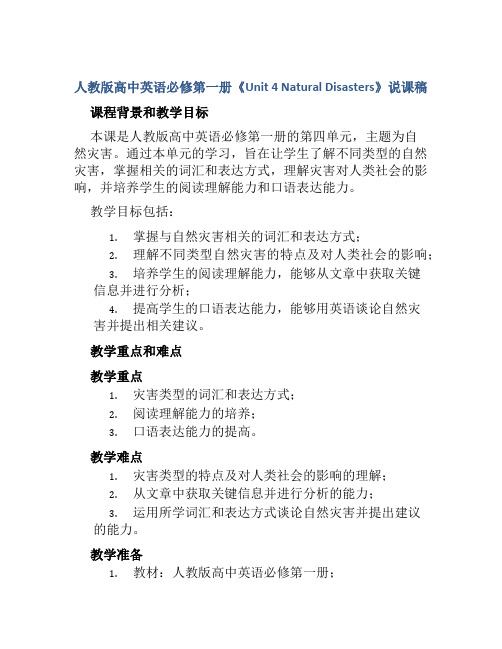
人教版高中英语必修第一册《Unit 4 Natural Disasters》说课稿课程背景和教学目标本课是人教版高中英语必修第一册的第四单元,主题为自然灾害。
通过本单元的学习,旨在让学生了解不同类型的自然灾害,掌握相关的词汇和表达方式,理解灾害对人类社会的影响,并培养学生的阅读理解能力和口语表达能力。
教学目标包括:1.掌握与自然灾害相关的词汇和表达方式;2.理解不同类型自然灾害的特点及对人类社会的影响;3.培养学生的阅读理解能力,能够从文章中获取关键信息并进行分析;4.提高学生的口语表达能力,能够用英语谈论自然灾害并提出相关建议。
教学重点和难点教学重点1.灾害类型的词汇和表达方式;2.阅读理解能力的培养;3.口语表达能力的提高。
教学难点1.灾害类型的特点及对人类社会的影响的理解;2.从文章中获取关键信息并进行分析的能力;3.运用所学词汇和表达方式谈论自然灾害并提出建议的能力。
教学准备1.教材:人教版高中英语必修第一册;2.多媒体设备:投影仪、电脑等。
教学步骤本节课的教学步骤分为三个主要部分:导入与预习、阅读理解、口语表达。
步骤一:导入与预习(10分钟)首先,通过提问学生关于自然灾害的问题来引入本节课的主题。
例如:•Have you ever experienced any natural disasters? Which ones?•What do you know about earthquakes / floods / hurricanes (choose one type of natural disaster)?•What kind of damage do you think natural disasters can cause?然后,让学生自由讨论并分享自己的观点和经历。
接下来,向学生简要介绍本单元的主题《Natural Disasters》并提问:•What do you think we will learn in this unit?•What kind of natural disasters do you think we will study?通过导入部分的讨论,激发学生的学习兴趣,为接下来的学习做好准备。
人教版高中英语必修第一册 UNIT 4 NATURAL DISASTERS Ⅴ

No one will forget the earthquake that struck Wenchuan in 2008,which caused great damage to the whole city.It destroyed buildings and killed or injured lots of people.In a few seconds,the entire city lay in ruins.The whole nation was shocked.A rescue team was organised to dig out those who were trapped.Shelters were built for the survivors.With efforts made by many people,the life of the citizens returned to normal.
3.Sb was doing...when...句型 I was having breakfast with my three children when water started filling my home. 当时我和三个孩子正在吃早饭,海水开始灌入屋内。
Ⅳ.重点语法
定语从句(1)——关系代词
6.Listen to the news.听听新闻吧。 7.Move to a safe place.搬到一个安全的地方。 8.Finally,... 最后,…… 9.Call an emergency number.拨打紧急电话。 10.Stay away from...离……远点。 11.Make sure...确保…… 12.Stay indoors.待在室内。
6.wisdom n.智慧;才智→ wise adj.明智的 7.suffer vt.遭受;蒙受 vi.(因疾病、痛苦、悲伤等)受苦 → sufferer n.受苦者;受难者 → suffering n.苦难;折磨 8.volcano n.火山→ volcanic adj.火山的 9.erupt vi.& vt.(火山)爆发;(岩浆、烟等)喷出 → eruption n.喷发 10.survive vi.生存;存活 vt.幸存;艰难度过 → survivor n.幸存者;生还者
全新版大学英语综合教程(第二版)第一册 Unit 4 课文翻译

Unit 4美国梦对不同的人有不同的意义,但对许多人,尤其是对移民而言,它意味着改善自己生活的机会。
对于他们,美国梦的含义就是才能与勤劳能让你从小木屋走向白宫。
托尼·特里韦索诺并没有爬到那么高,但他成功地使自己的梦想成真。
托尼·特里韦索诺的美国梦——弗雷德里克·C·克罗弗德他来自意大利罗马以南某地一个遍地是石头的农庄。
他什么时候以及怎么到美国的,我不清楚。
不过,有天晚上,我看到他站在我家车库后面的车道上。
他身高五英尺七、八左右,人很瘦。
“我割你的草坪,”他说。
他那结结巴巴的英语很难听懂。
我问他叫什么名字。
“托尼·特里韦索诺,”他回答说,“我割你的草坪。
”我对托尼讲,本人雇不起园丁。
“我割你的草坪,”他又说道,随后便走开了。
我走进屋子,心里有点不快。
没错,眼下这大萧条的日子是不好过,可我怎么能把一个上门求助的人就这么打发走呢?等我第二天晚上下班回到家,草坪已修整过了,花园除了草,人行道也清扫过了。
我便问太太是怎么回事。
“有个人把割草机从汽车库里推出来就在院子里忙活起来,”她回答说,“我还以为是你雇他来的。
”我就把前晚的事跟她说了。
我俩都觉得奇怪,他怎么没提出要工钱。
接下来的两天挺忙,我把托尼的事给忘了。
我们在尽力重整业务,要让一部分工人回厂里来。
但在星期五,回家略微早了些,我又在汽车库后面看到了托尼。
我对他干的活夸奖了几句。
“我割你的草坪,”他说。
我设法凑了一小笔微薄的周薪,就这样托尼每天清扫院子,有什么零活,他都干了。
我太太说,但凡有重物要搬或有什么要修理的,他挺派得上用场。
夏去秋来,凉风阵阵。
“克罗先生,快下雪了,”有天晚上托尼跟我说,“等冬天到了,你让我在厂里干扫雪的活。
”啊,对这种执着与期盼,你又能怎样呢?自然,托尼得到了厂里的那份活儿。
几个月过去了。
我让人事部门送上一份报告。
他们说托尼干得挺棒。
一天我在汽车库后面我们以前见面的地方看到了托尼。
(完整版)英语第一册第三版Unit4

ENGLISH
第一册
第三版
CONTENTS Unit 1 Family Unit 2 Campus Unit 3 Friends Unit 4 Sports
Unit 5 Food Unit 6 Health Unit 7 Travel Unit 8 Plans
Unit 4 Sports
WARM-UP
TEXT
ORAL
WORD
COMMUNICATION SKILLS
SPECIAL DIFFICULTIES
STRUCTURE & GRAMMAR
healthy others ticket season Activity hunting fishing
New Words
/ˈhelθi/ /ˈʌðə(r)/ /ˈtɪkɪt/ /ˈsiːzn/ /ækˈtɪvəti/ /ˈhʌntɪŋ/ /ˈfɪʃɪŋ /
STRUCTURE & GRAMMAR
Arab Arabs Australia USA Canada
Proper Names
/ˈærəb/ /ˈærəbz/ / ɒ'streɪlɪə / /ˌjuː es ˈeɪ/ /'kænədə /
阿拉伯 阿拉伯人 澳大利亚 美国 加拿大
WARM-UP
TEXT
Sports change with the seasons. People play different games in summer and winter.
Swimming is fun in warm weather, but skating is good in winter.
Games and sports often grow out of people’s work and everyday activities. The Arabs use horses or camels in much of their everyday life. They use them in their sports, too.* It is the same with people in the northwest of China.
新译林牛津必修第一册unit4重点单词及词汇

concentrate vi.& vt.集中(注意力、思想c等on)c;entration n.集中精力
固搭: concentrate on 集中精力于 concentrate one's attention on 集中注意力于
He sat there, with his attention concentrated (concentrate) on his book。 Concentration (concentrate) is essential if you want you want to do a job.
i m m e d i a t e l y →immediate adj.立即的
固搭:act immediately 立即行动
immediately+从句
→一...就
The telephone rang, and he answered it immediately.
Peter rang me up immediately he got off the plane. 彼得一下飞机就给我打了电话。
第一册 unit4课文翻译

Unit4 Text AMany teenagers believe that growing up is a struggle to be independent. They want to be free from their parents' control and they want to be different. Read the following text and see how a young man struggles to stand on his own two feet.很多青少年认为长大就要努力变得独立。
他们不想再受父母的控制,他们想要变得与众不同。
阅读下面的文章,看看一个年轻人是如何挣扎着自食其力的。
The Doctor's Son医生的儿子Harold Eppley with Rochelle Melander哈罗德•埃普利、罗谢尔•梅兰德合写My parents moved to Vermont when I was still an infant. A soft-spoken man, my father settled quietly into his medical practice in a small town called Enosburg. Soon the local people accepted him as one of their own. Word passes quickly in small Vermont towns. They know good people when they meet them. Around town the neighbors greeted my father as "Doc Eppley." And I soon learned that as long as I lived in Enosburg I would always be known as "Doctor Eppley's son."我还是个婴儿的时候,我的父母亲搬到了佛蒙特州。
2020新译林版高中英语选修第一册Unit4单词表详解
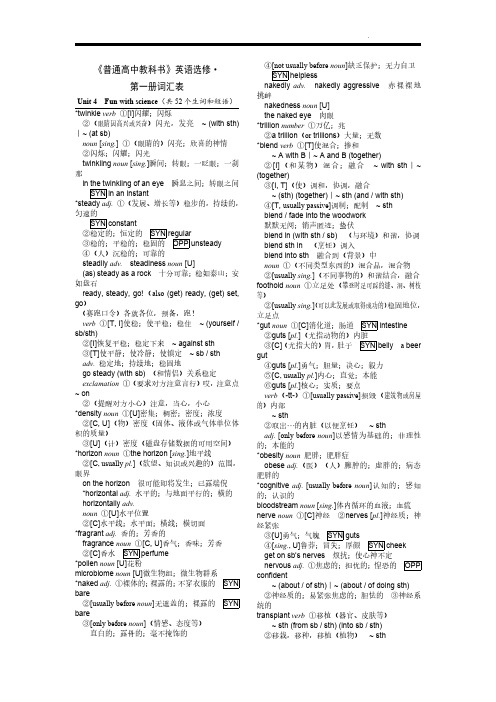
《普通高中教科书》英语选修·第一册词汇表Unit 4Fun with science (共52个生词和短语)*twinkle verb ①[I ]闪耀;闪烁②(眼睛因高兴或兴奋)闪光,发亮~(with sth)︱~(at sb)noun [sing.]①(眼睛的)闪亮;欣喜的神情②闪烁;闪耀;闪光twinkling noun [sing.]瞬间;转眼;一眨眼;一刹那of an eye 瞬息之间;转眼之间an instant①(发展、增长等)稳步的,持续的,unsteady ④(人)沉稳的;可靠的steadily adv.steadiness noun [U ](as)steady as a rock 十分可靠;稳如泰山;安如盘石ready,steady,go!(also (get)ready,(get)set,go )(赛跑口令)各就各位,预备,跑!verb ①[T,I ]使稳;使平稳;稳住~(yourself /sb/sth)②[I ]恢复平稳;稳定下来~against sth ③[T ]使平静;使冷静;使镇定~sb /sth adv.稳定地;持续地;稳固地go steady (with sb)(和情侣)关系稳定exclamation ①(要求对方注意言行)哎,注意点~on②(提醒对方小心)注意,当心,小心*density noun ①[U ]密集;稠密;密度;浓度②[C,U ](物)密度(固体、液体或气体单位体积的质量)③[U ](计)密度(磁盘存储数据的可用空间)*horizon noun ①the horizon [sing.]地平线②[C ,usually pl.](欲望、知识或兴趣的)范围,眼界on the horizon 很可能即将发生;已露端倪*horizontal adj.水平的;与地面平行的;横的horizontally adv.noun ①[U ]水平位置②[C ]水平线;水平面;横线;横切面*fragrant adj.香的;芳香的fragrance[C,U ]香气;香味;芳香②[C ]香水perfume *pollen noun [microbiome noun [U ]微生物组;微生物群系*naked adj.①裸体的;裸露的;不穿衣服的bare②[usually before noun ]无遮盖的;裸露的bare③[only before noun ](情感、态度等)直白的;露骨的;毫不掩饰的before noun ]缺乏保护;无力自卫helplessadv.nakedly aggressive 赤裸裸地挑衅nakedness noun [U ]the naked eye 肉眼*trillion number ①万亿;兆②a trillion (or trillions )大量;无数*blend verb ①[T ]使混合;掺和~A with B ︱~A and B (together)②[I ](和某物)混合;融合~with sth ︱~(together)③[I,T ](使)调和,协调,融合~(sth)(together)︱~sth (and /with sth)④[T,usually passive]调制;配制~sth blend /fade into the woodwork 默默无闻;销声匿迹;蛰伏blend in (with sth /sb)(与环境)和谐,协调blend sth in (烹饪)调入blend into sth 融合到(背景)中noun ①(不同类型东西的)混合品,混合物②[usually sing.](不同事物的)和谐结合,融合foothold noun ①立足处(攀登时足可踩的缝、洞、树枝等)②[usuallysing.](可以此发展或取得成功的)稳固地位,立足点*gut noun ①[C ]消化道;肠道intestine ②guts[pl.]③[C ](尤指大的)胃,肚子belly a beer gut④guts [pl.]勇气;胆量;决心;毅力⑤[C ,usually pl.]内心;直觉;本能⑥guts [pl.]核心;实质;要点verb (-tt-)①[usually passive]损毁(建筑物或房屋的)内部~sth②取出…的内脏(以便烹饪)~sthadj.[only before noun ]以感情为基础的;非理性的;本能的*obesity noun 肥胖;肥胖症obese adj.(医)(人)臃肿的;虚胖的;病态肥胖的*cognitive adj.[usually before noun ]认知的;感知的;认识的bloodstream noun [sing.]体内循环的血液;血流nerve noun ①[C ]神经②nerves [pl.]神经质;神经紧张③[U ]勇气;气魄guts④[sing.,U ]cheek get on sb’s nerves nervous adj.①焦虑的;担忧的;惶恐的confident~(about /of sth)︱~(about /of doing sth)②神经质的;易紧张焦虑的;胆怯的③神经系统的transplant verb ①移植(器官、皮肤等)~sth (from sb /sth)(into sb /sth)②移栽,移种,移植(植物)~sth③使迁移;使移居~sb/sth(from…)(to…) transplantation noun[U]liver transplantation 肝脏移植noun①[C,U](器官等的)移植②[C]移植器官*vaccine noun[C,U]疫苗;菌苗*malnutrition noun[U]营养不良*droplet noun小滴*isolation noun[U]①隔离;隔离状态~(from sb /sth)②孤独;孤立状态~(from sb/sth)in isolation(from sb/sth)单独地;孤立地isolate verb①(使)隔离,孤立,脱离~sb/yourself/sth(from sb/sth)②将……剔出(以便看清和单独处理)~sth(from sth)③(术语)使(某物质、细胞等)分离;使离析~sth(from sth)isolated adj.①(建筑物或地方)偏远的;孤零③单独的;只出现一次的*inject verb①(给……)注射(药物等)~sth(into yourself/sb/sth)︱~yourself/sb/sth (with sth)②(给……)注射(液体)~A(with B)︱~B(into A)③(给……)添加,增加(某品质)~sth(into sth)④(给……)投入(资金)~sth(into sth) injection noun①[C,U]注射②[C]大量资金的投入③[U,C](液体)注入,喷入*sequence noun①[C]一系列;一连串②[C,U]顺序;次序③[C](电影中表现同一主题或场面的)一组镜头verb①(术语)按顺序排列~sth②(生)测定(整套基因或分子成分的)序列~ sthsequencing noun[U]*snowflake noun雪花;雪片alike adj.相像;十分相似adv.①十分相像地;很相似地②两者都;同样地*crystal noun①[C]结晶;晶体②[U,C]水晶(如石英,用于制作珠宝饰物)③[U]水晶玻璃④[C](NAmE)石英玻璃表护面;塑料表护面;表蒙子*melt verb①[I,T](使)熔化,融化~sth②[I,T](使)软化,变得温柔~sthmelting adj.感人的;柔情似水的;令人爱怜的;可同情的melt away︱melt sth away(使)慢慢消失melt into sth逐渐融入;渐渐与某物成为一体*feather noun羽毛;翎毛*miracle noun①[C]圣迹;神迹wonder②[sing.]奇迹;不平凡的事③[C]极好的例子;精品~of sthwork/perform miracles*particle noun①颗粒;微粒②(物)粒子③(语法)小品词(与动词构成短语动词的副词或介词)*vapour(NAmE vapor)noun[C,U]蒸气;潮气;雾气*molecule noun(化)分子molecular adj.*accumulate verb①[T]积累;积聚~sth amass②[I](数量)逐渐增加;(数额)逐渐增长build upaccumulation noun[U,C]*humidity noun[U]①(空气中的)湿度②湿热;高温潮湿resist verb①[T,I]~(sth)︱~doing sth oppose②[I,T]③[T,I](通常用于否定句)忍住;抵挡~(sth)︱~ doing sth④[T]使不受……的伤害;抗(伤害)~sth resistance noun①[U,sing.]反对;抵制;抗拒~(to sb/sth)②[U,sing.]抵抗;反抗~(to sb/sth)③[U,sing.]抗力;抵抗力~(to sth)④[U,sing.]阻力~(to sth)⑤[U,C](物)(symb R)电阻⑥often the Resistance[sing.+sing./pl.v.](尤指敌占区的)秘密抵抗组织*texture noun[C,U]①质地;手感②口感③(音乐或文学的)谐和统一感,神韵*lubrication noun润滑;润滑作用*bionics noun仿生学*intersect verb①[I,T](线、道路等)相交;交叉~(sth)︱~with sth②[T,usually passive]横穿;贯穿;横断~sth (with sth)*carpenter noun木工;木匠*saw noun(常构成复合词)锯verb(sawed,sawn)(NAmE also sawed,sawed)①[I,T]锯+adv./prep.︱~sth(+adv./prep.)②[I,T]拉锯似地来回移动(某物)~(away)(at sth)︱~sthsaw sth down锯倒saw sth off︱saw sth off sth锯掉;锯去saw sth up(into sth)把……锯成(小块或碎片)fit in(with sb/sth)(与……)合得来;适应*spiral noun①螺旋形;螺旋式②逐渐加速上升(或下降)adj.螺旋形的;螺旋式的spirally adv.verb(-ll-,NAmE usually-l-)①[I]螺旋式上升(或下降);盘旋上升(或下降)(+adv./prep.)②[I]急剧增长+adv./prep.spiral down/downward急剧减少cancel out︱cancel sth out抵销;对销cancel verb①[T]取消;撤销;终止~sth②[T,I]撤销;取消;废除(具有法律效力的协议)~(sth)③[T]盖销,注销(票或邮票)~sth[I,T](使)加强,增强,加剧~sthnoun[U,sing.]be inset into sth被嵌入inset noun①(套印在大图片、地图等中的)小图,小地图②嵌入物;附加物verb(insetting,inset,inset)①[usually passive]嵌入,插入(作为装饰等)~A(with B)︱~B(into A)②(在大图片、地图等中)套印(小图)~sth (into sth)banknote(especially BrE)(NAmE usually bill)noun[C]纸币;钞票*exoskeleton noun(生)(昆虫等动物的)外骨骼skeleton noun①骨骼;骨架;骨骼标本②骨瘦如柴的人(或动物)sing.](建筑物等的)骨架,框架sing.]梗概;提纲;提要;轮廓⑤~staff,crew,etc.(维持运转所需的)最少人员,基干人员a skeleton in the cupboard(also a skeleton in the closet)隐衷;不可外扬的家丑backdrop(BrE also backcloth)noun①(舞台的)背景幕布②(事件发生时)周围陪衬景物③(事态或活动的)背景hook noun①钩;钓钩;挂钩;鱼钩②吸引人的事物;诱饵verb①[T,I](使)钩住,挂住~sth+adv./prep.︱+adv./prep.②[T,I](用腿、胳膊、手指等)钩住,箍住~sth+adv./prep.︱+adv./prep.③[T]钓鱼~sthhooked adj.①弯曲的;钩形的a hooked nose/beak/finger鹰钩鼻子;钩喙;屈指②上瘾;(尤指)有毒瘾~(on sth)③(对某事)着迷~(on sth)*cube noun①立方体;立方形②立方形的东西(尤指食物)cubic adj.①(abbr.cu.)立方的②立方形的。
- 1、下载文档前请自行甄别文档内容的完整性,平台不提供额外的编辑、内容补充、找答案等附加服务。
- 2、"仅部分预览"的文档,不可在线预览部分如存在完整性等问题,可反馈申请退款(可完整预览的文档不适用该条件!)。
- 3、如文档侵犯您的权益,请联系客服反馈,我们会尽快为您处理(人工客服工作时间:9:00-18:30)。
Unit 4
American Dream
Cultural Notes
Warm-up Questions
LOGO
While-reading
Unit 4
American Dream
Global reading
Detailed reading
LOGO
While-reading >> Global reading
Unit 4
American Dream
Table Completion
How Tony Fulfilled His American Dream
Para(s) 1~10
Time Expressions one evening during the Great Depression
LOGO
Unit 4
American Dream
Immigrants >> First Immigrants
LOGO
Immigrants >> First Immigrants
Unit 4
American Dream
28~33
LOGO
While-reading >> Global reading
Unit 4
American Dream
Scanning
Scan the text to find out descriptions of Tony’s physical appearance.
Tony’s Steps toward Success Tony bought a farm and sent for his family in Italy. Tony died, leaving his family a prosperous farm and his children educated.
Unit 4
American Dream
While-reading >> Global reading
Text Organization and Analysis Parts 1 Para(s) 1~29 Main Ideas With determination and with help from Mr. Crawford, Tony achieved his dream of having his own farm. Tony’s career set the author thinking about why and to what extent he had been successful.
Para. 1 Para. 22 Para. 27
He was about five-foot-seven or eight, and thin. He seemed to stand a little straighter. He was heavier. He had a look of confidence. … neatly dressed
LOGO
Warm-up Questions
Unit 4
American Dream
1. What is the American Dream in your opinion? 2. In what ways can a person be considered as being successful? 3. What is the key to success? 4.Tell a story of a successful person.
LOGO
Unit 4
American Dream
Immigrants >> Introduction
Indians Apart from “Native Americans” — ____________ , all Americans have ancestors who were immigrants. The United States has ____________ become the home of immigrants from all over the world. Some immigrants come to the United States in search of _________________ a place to practice their religion economic freely, while others seek political or _____________ protection. Still others arrive in hopes of building a better life for ________________and their themselves families.
LOGO
While-reading >> Global reading
Unit 4
American Dream
Text Organization and Analysis
Further Understanding
LOGO
LOGO
While-reading >> Global reading
Unit 4
American Dream
Para(s) 14~16
Time Expressions one day
Tony’s Steps toward Success Tony asked to be trained as an apprentice, and later learned to be a skilled worker. Tony bought a house with the help of Mr. Crawford.
17~21
a year or two passed
LOGO
While-reading >> Global reading
Unit 4
American Dream
Para(s) 22~27
Time Expressions aftБайду номын сангаасr about two years during the war
LOGO
Immigrants
Introduction
First Immigrants
LOGO
Immigrants >> Introduction
Unit 4
American Dream
Listen to the passage and fill in the blanks with the missing words.
Tony’s Steps toward Success Tony started to work as a help at Mr. Crawford’s house.
11~13
summer passed into fall
Tony got a job clearing snow at Mr. Crawford’s factory.
The first immigrants to America came almost from western Europe. During the first decades of the 17th century, settlers from England colonized Virginia and New England. Immigration to New England began in 1620 when English Puritans established Plymouth Colony in present-day Massachusetts. The values of these Puritan settlers strongly influenced the culture of the American colonies and later of the United States.
LOGO
Cultural Notes
1
The American Dream
2
Immigrants
3
The Great Depression
LOGO
The American Dream
Unit 4
American Dream
LOGO
Unit 4
American Dream
Unit 4
American Dream
1
Pre- reading While-reading
After reading
2 3
Post-reading Click to add Title
LOGO
Pre-reading
LOGO
The Great Depression
Unit 4
American Dream
LOGO
The Great Depression
Unit 4
American Dream
The Great Depression is considered the most severe economic crisis in the industrialized world. It began when American stock market fell on Friday, Oct. 24, 1929, and continued the following Tuesday, known as Black Tuesday, with a greater fall. The Depression struck many other countries as well, particularly Germany, Japan, and Britain. In the early 1930s millions of people lost their jobs, and millions of businesses and banks failed. President Franklin D. Roosevelt’s New Deal policies improved the situation, but the Great Depression did not come to an end until World War II when industrial production for the war increased.
